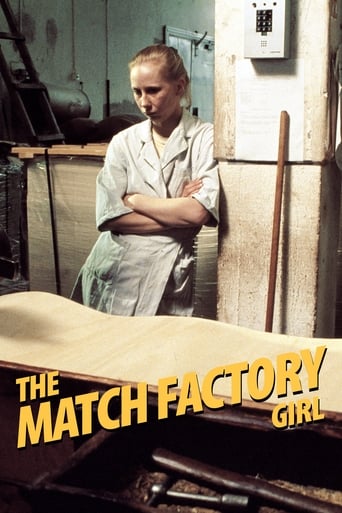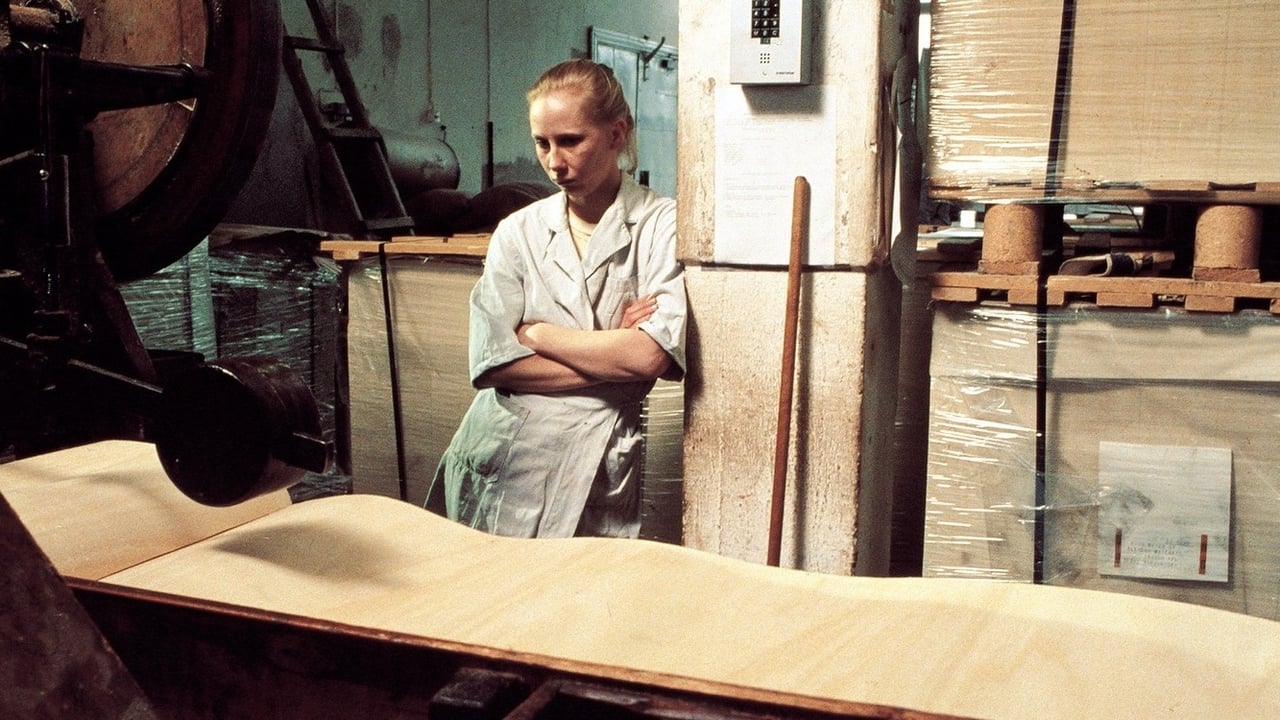LeofricsBeloved
Though this is the story about the Helsinki native Iiris, this story can easily be the story of any modern woman. It is the lack of "remarkable" and grandiose quality of this film that makes it so powerful. It portrays reality as clearly as possible. The photography is clinical which forces the audience to fully engage in the mundane, secretly heartbreaking universe of Iiris. The complete lack of glamor forces us to see the modern woman's suffering as it is, rather than the fantasy (a la Sex in the City) that we have been spoon-fed. I would rather be told the truth than to be told a lie or live in denial about our reality. If we don't clearly see the problems of our reality, we can never identify what it is we need to grow and change. Though Iiris chose to destroy her world rather than create a new life that she would more enjoy, I completely understand why she chose to do so. The mark of a good director is to make you care about the fate of a character. Kaurismaki did this in spades, so thank you.
Martin Bradley
To say that nobody makes movies like so-and-so tells us nothing about the kind of film we are watching yet one has only to say the name Aki Kaurismaki and you know that no-one else makes movies quite like him and you know exactly what you are going to get. Kaurismaki's movies are mostly short, funny in a black, very sad sort of way and to say they are minimalist is ... well, something of an understatement to say the least. He is one of the great directors, though the very simplicity of his work might make people think otherwise."The Match Factory Girl" is one of his very best films. Dialogue is kept to a minimum, (before any of the characters actually speak we hear a news report and a song). Indeed, there are times when you feel this could just as easily have worked as a silent film as Kaurismaki clearly knows that you don't need words to convey what is happening or to explain the emotions that are on display.The Match Factory girl of the title is Iris, (a superb Kati Outinen), who dreams of escaping her dead-end job in the local match factory and ends up pregnant after a one-night stand. This unplanned for event is the catalyst that prompts her to take some kind of action that will radically alter her situation in a way you are not likely to expect.There isn't really much to it. It clocks in at an economical 66 minutes and it is like the perfect short story. Perhaps we wouldn't want to, or don't really need to, spend any more time with Iris than we have to, (she's not an attractive character in any way). It only takes the short running time of this picture to tell us all we need to know about her and as the film progresses our initial apathy turns into a kind of grudging admiration. Small, yes; minimal, most definitely and really rather wonderful.
MartinHafer
The story is told using very little dialog and has almost zero energy. It concerns a young and not particularly vivacious nor attractive young lady. She works, rents space in her mother's inhospitable house, has no friends and seems to exist instead of live. And, the performance is rather zombie-like. After spending much of the film being mistreated by others, she buys rat poison and gives it to people--several of which actually seem to deserve it (at least to a degree). Then, the police arrest her and the film ends. According to the intro by Turner Classic Movies, Roger Ebert loved this film. It also has a reasonably high overall score of 7.6. I cannot understand either, as the film is about as enjoyable to watch as films showing clips of war atrocities! To say it's unpleasant is a definite understatement but this alone is not a problem--it's also a film that, at least to me, seems pretty pointless. This can also be said of some of director Kaurismaki's other films, such as "Ariel".Strange and certainly not for most tastes.
Graham Greene
The Match Factory Girl (1990) was the final part of director Aki Kaurismäki's informal trilogy of films dealing with the day-to-day grind of working class characters on the fringes of society. The first two instalments were Shadows in Paradise (1986), in which a lonely bin man begins a relationship with a no-nonsense shop assistant in the hope of finding an escape from his repetitive, directionless existence, and Ariel (1988), wherein an unemployed man sets out for the bright lights of Helsinki and finds himself caught up in a series of delightfully picaresque adventures. For me, The Match Factory Girl was the least interesting and least successful of the three; lacking the broader elements of comedy found in the first film or the skillful story-telling and unconventional directorial touches of the second. It is still worth experiencing, and indeed, the rest of the reviews here are filled with glowing praise and rapturous acclaim, but for me, it simply failed to captivate me like many of Kaurismäki's other, more ambitious projects.The film is typical of the director's idiosyncratic style, with flat, deadpan performances, minimalist dialog, simplistic storytelling and an interesting juxtaposition between drab, naturalistic production design and warm cinematography. There are also the usual Kaurismäki preoccupations with 50's iconography, the use rock and roll music and melodramatic popular song to both punctuate and comment upon the story as it unfolds, and the uncomfortable moments of contemplative silence that propel the story without the usual need for dialog and character interaction. Indeed, this would seem to be one of the main concerns of The Match Factory Girl, with the lack of communication between the characters pushing the film into a darker territory that we might not usually expect. I don't think it is handled quite as well as it could have been, and indeed, at times felt reminiscent of the director's first film, the contemporary-set adaptation of Crime and Punishment (1983). Like Crime and Punishment, The Match Factory Girl opens with a repetitive and mechanical montage showing the central character's work, as a lump of wood is cut down, filed, processed and sorted through machine after machine, until a single file of little tiny matches pass on a conveyor belt before being boxed and sorted by the shy and dowdy Iris.The central performance from Kati Outinen is as good as you could expect from Kaurismäki's work, filled with empathy and a heartbreaking pathos that permeates the very centre of this sad and tragic tale. What most impresses us about the actress is her ability to suggest so much about the character without the use of predictable dialog; with her monotonous daily routine and lack of any kind of joy or colour at both work and home reflected in her face, movements and body language. Her most lengthy piece of dialog is heard in voice over, as she dictates a letter that she is writing to a man that she has recently had a one night stand with, and hopes that he might want to get in touch with her, not only for her own sake, but the sake of the baby that she is carrying. It is a completely heartbreaking sequence, and the only occasion wherein we get a sense of Iris as an intelligent and bright young woman able to express her thoughts and feelings eloquently. Few of the other characters in the film say more than two or three lines of dialog throughout the comparatively short sixty-odd minute running time, which seems to simply reinforce the uncomfortable and tragic loneliness at the centre of this character's life.However, where the film failed to work for me was in the presentation of the last ten to fifteen minutes, in which the emphasis on social-realist clichés and Kaurismäki's typically deadpan approach to character and drama gave way to a darker aspect that I felt was underdeveloped. Some have drawn comparisons with this film to Michael Haneke's similarly cold examinations into social dissatisfaction and cultural alienation in films like The Seventh Continent (1989) and 71 Fragments of a Chronology of Chance (1994), particularly in the way in which Kaurismäki uses the relentless background chatter of radio reports and TV news footage of the escalating violence of the protests in Beijing and the Tiananmen Square incident to foreground the narrative, whilst simultaneously foreshadowing later events and the eventual theme of defiance. However, at only a fraction over an hour in length, these ideas felt unfinished and somewhat rushed, with the really interesting notions of the film only really coming to our attention during the third and final act.The ending is no doubt an ironic swipe at Hollywood film-making, in which the emphasis seems to be on tying together loose ends and closing the book on the very last page. Here, Kaurismäki gives us an ending that suggests so much without ever spelling things out. It's a nice touch, in keeping with his usual approach to storytelling, but again, for me, felt somewhat underdeveloped. Other viewers haven't had such problems, but having arrived at this film after two of my very favourite Kaurismäki films, Hamlet Goes Business (1987) and Ariel, both of which I consider to be early masterpieces, I probably expected too much. Regardless, The Match Factory Girl is an interesting enough film from Kaurismäki, one that shows the continuation of his typical approach to cinema and his various thematic concerns - and one that is certainly worth experiencing, if only for the unconventional lead performance from Kati Outinen - but one that I also feel is something of less successful retread of Crime and Punishment and Shadows in Paradise.


 AD
AD


